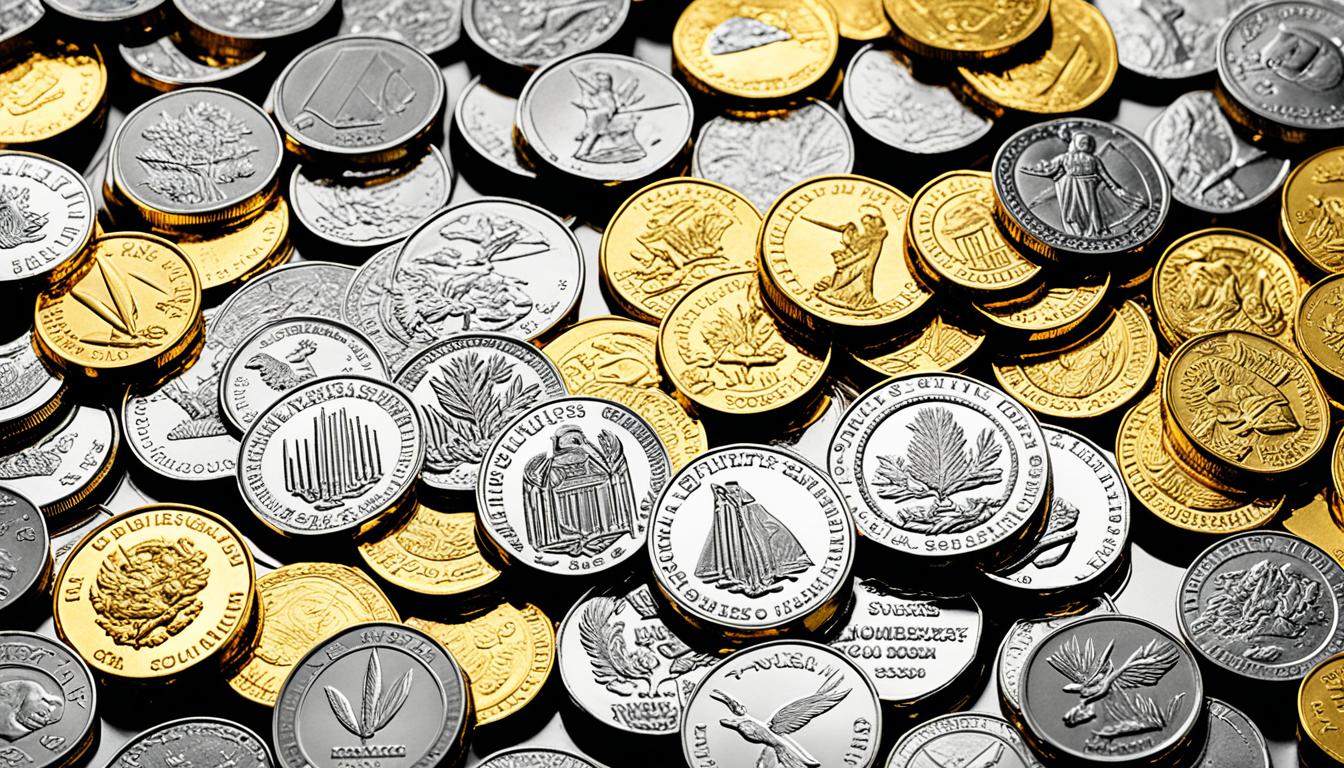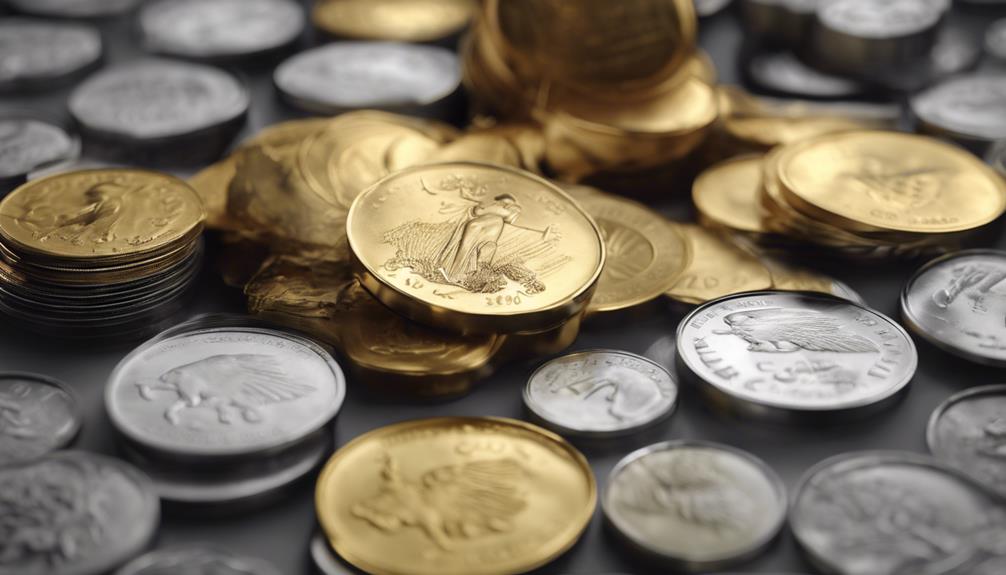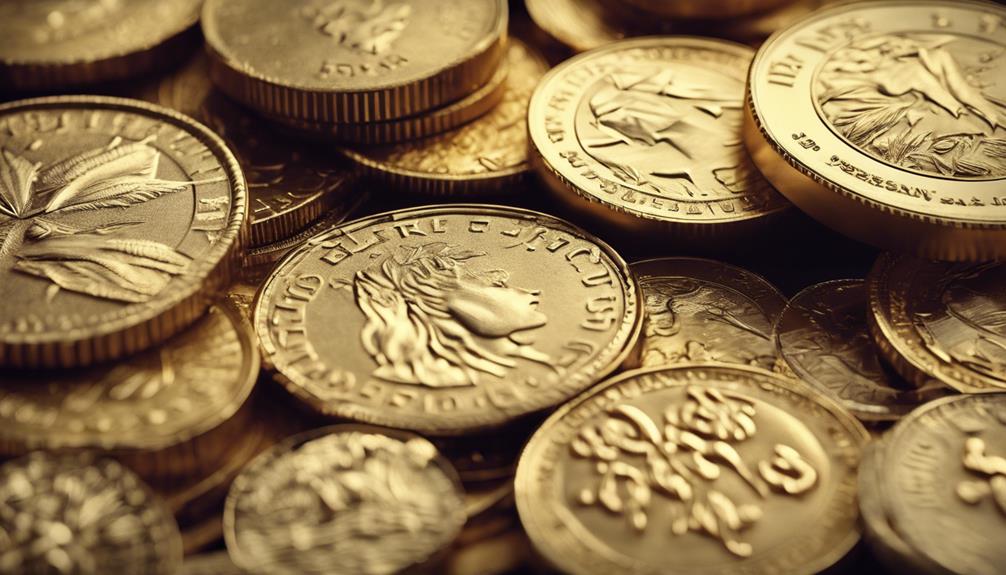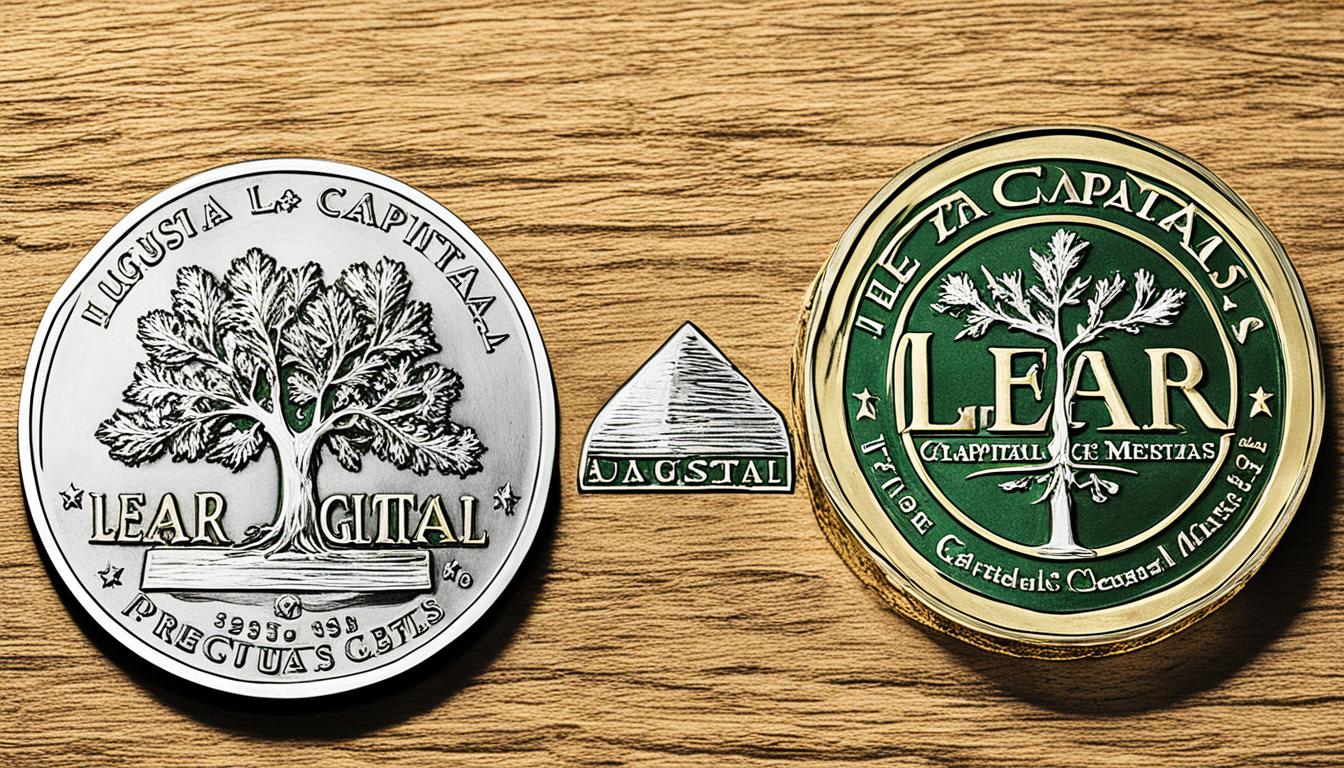Were you aware that in 2020, the worldwide demand for precious metals soared to a remarkable $185.9 billion?
Investing in precious metals has long been considered a safe haven for preserving wealth and diversifying investment portfolios. However, before diving into this alternative asset class, it’s crucial to ask the right questions to make informed decisions and maximize returns.
Key Takeaways:
- Before investing in precious metals, it’s important to consider the type of investment (physical, digital, or paper) that best suits your needs and risk tolerance.
- Allocated precious metals offer the highest level of security, providing ownership title and segregation from third-party risks.
- Understanding the markup on spot metal prices and ongoing costs, such as storage and management fees, is essential for assessing the overall value of your investment.
- Choosing a reputable storage facility ensures the safety and security of your precious metal holdings.
- Considering the option and ability to take physical delivery of your investment is important, as it may impact your flexibility and cost.
By addressing these essential queries and taking into account factors like taxation implications and the liquidity of your investment, you can navigate the world of precious metals with confidence and potentially enhance your investment portfolio’s stability.
Physical, Digital, or Paper Investments?
When it comes to investing in precious metals, one of the first decisions to make is the type of investment you want to pursue. There are three primary options: physical precious metals, digital gold, and paper gold.
Physical precious metals refer to tangible assets such as coins and bars. These investments provide direct ownership and are free from counterparty risk. Holding physical precious metals allows you to have full control and possession of your investment, offering a sense of security.
Digital gold, on the other hand, is a relatively new and innovative investment option. With digital gold, investors can gain exposure to the price of gold without physically owning the metal. It offers the convenience of trading and storing gold digitally, providing flexibility and accessibility.
Lastly, paper gold investments include instruments like gold certificates and futures contracts. These investments are typically unbacked by physical metal, carrying higher risk. While they provide exposure to the price movement of gold, they may lack the security and ownership benefits that physical and digital investments offer.
To determine the best investment option for you, consider your investment objectives, risk tolerance, and preferences. Physical precious metals provide direct ownership, digital gold offers accessibility, while paper gold investments may be more suitable for those seeking exposure to gold price movements.

Owning Physical Precious Metals
“Physical precious metals offer direct ownership and a tangible asset that you can hold in your hands.”
Investing in Digital Gold
“Digital gold provides a convenient way to gain exposure to the price of gold without owning physical metal.”
Considerations for Paper Gold Investments
“Investing in paper gold comes with higher risk and potential lack of physical metal ownership.”
Comparison of Physical, Digital, and Paper Investments
| Investment Type | Ownership | Risk of Counterparty | Flexibility |
|---|---|---|---|
| Physical Precious Metals | Direct ownership | Minimal | Relatively low |
| Digital Gold | Digital ownership | Minimal | High |
| Paper Gold | Beneficial ownership | Moderate | High |
Allocated or Unallocated Metals?
When considering investing in precious metals, one crucial decision to make is whether to opt for allocated or unallocated metals. Both options have their pros and cons, but understanding the differences can help you make an informed choice.
Allocated metals offer the highest degree of investor safety. With allocated metals, you receive ownership title to specific physical assets. These metals are segregated and kept separate from other investors’ holdings. This segregation ensures that your metals are unencumbered and cannot be lent or leased to third parties. Allocated metals provide a sense of security, as you have direct ownership and complete control over your investment.
In contrast, unallocated metals introduce counterparty risk. When you invest in unallocated metals, you do not hold ownership title to specific assets. Instead, you hold an entitlement to a certain quantity of metal within a pool held by the issuer. This arrangement means that your investment is backed by the creditworthiness of the issuer. In the event of issuer insolvency, you may become an unsecured creditor, which can result in significant losses.
Another potential drawback of unallocated metals is the possibility of exceeding the total amount of underlying metal. This occurs when the issuer sells more metal entitlements than the physical metal it actually holds. If too many investors demand physical delivery, it can strain the issuer’s ability to fulfill those requests.
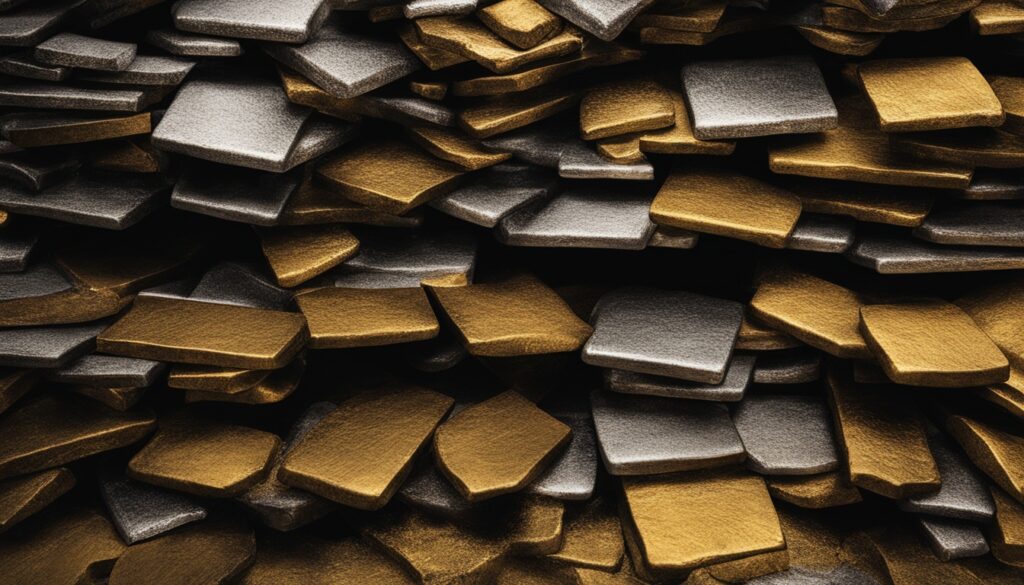
| Allocated Metals | Unallocated Metals | |
|---|---|---|
| Ownership Title | Direct ownership title to specific assets | No ownership title; you hold an entitlement to a pool of metal |
| Counterparty Risk | No counterparty risk; metals are segregated and unencumbered | Introduces counterparty risk; backed by the creditworthiness of the issuer |
| Issuer Insolvency | No impact on ownership; metals remain yours | Possible loss of investment; investors become unsecured creditors |
Investing in fully allocated precious metals is a prudent choice for those seeking maximum security and control over their investments. However, it’s important to weigh the pros and cons carefully and consider your risk tolerance before making a decision.
Markup on Spot Metals Prices
When investing in precious metals, understanding the markup on spot prices is essential. The spot price refers to the current market value of the metal, while the markup represents the additional cost added to the spot price when purchasing coins and bars.
The markup on precious metals can vary depending on several factors, including the rarity, purity, volume, and dealer inventories of the metal. Typically, the markup ranges between 2% and 8%, with certain rare or collectible pieces commanding higher premiums.
For investors considering exchange-traded funds (ETFs), these investment vehicles are designed to closely track the spot price. However, it’s crucial to be aware that ETFs charge annual management fees to cover administrative costs and generate profits for the management company.
Closed-end funds, on the other hand, may trade at significant discounts to the underlying spot price. Still, some closed-end funds offer an option for investors to redeem shares for physical metal, eliminating the disparity between the spot price and the fund’s trading price.
To make an informed investment decision, it’s important to compare markups and management fees across different investment options. By doing so, you can determine the most cost-effective approach to investing in precious metals.
Comparing Markups and Management Fees:
To illustrate the cost differences associated with investing in precious metals, consider the following comparison between purchasing physical coins and investing in an ETF:
| Investment Option | Markup | Management Fees |
|---|---|---|
| Purchasing Physical Coins | 2% – 8% | N/A |
| Investing in ETFs | Nominal markup | Annual management fees |
As shown in the table, purchasing physical coins may include a markup ranging from 2% to 8%, which is typically a one-time cost. On the other hand, investing in ETFs might involve a nominal markup or premium over the spot price, but investors should consider the recurring annual management fees as an ongoing cost.
By evaluating both markups and management fees, individuals can assess the overall expenses associated with their precious metals investment and make an informed decision based on their personal financial goals and preferences.
Investing in precious metals offers a tangible and potentially lucrative opportunity for diversifying one’s investment portfolio. Understanding the markup on spot metals prices and comparing it with management fees is crucial for maximizing the return on investment. By conducting thorough research and carefully considering the costs involved, investors can make informed choices and embark on a successful journey of investing in precious metals.
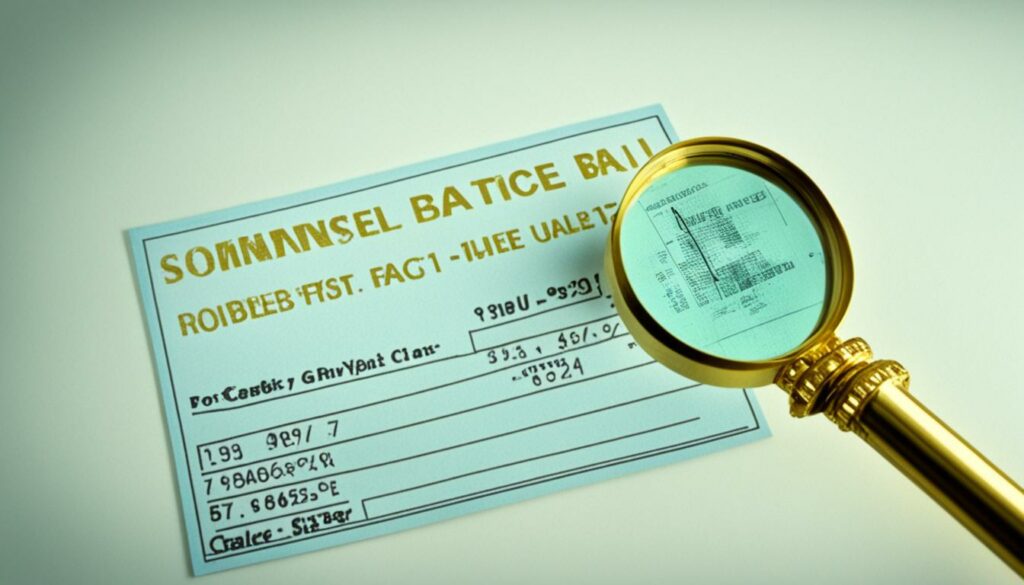
Where to Store Your Precious Metals
The storage of precious metals is a crucial consideration for investors. Storing metal with a risky counterparty should be avoided to mitigate counterparty risk. Reputable storage providers that offer insured storage can provide peace of mind. For ETFs and closed-end funds, it is advisable to avoid storage custodians that are subsidiaries of levered financial institutions to minimize counterparty risk. Choosing trustworthy and reputable storage facilities ensures the safety and security of your investment.
When it comes to investing in precious metals, ensuring the safety and security of your holdings is of utmost importance. Precious metals like gold, silver, platinum, and palladium are valuable and can be a target for theft or unauthorized access. That’s why finding reliable and secure storage facilities is essential.
Investors have several options for precious metals storage. One option is to store your metals at home. While this gives you immediate access to your investment, it also carries certain risks. Storing large quantities of precious metals at home can make you a target for theft, and the storage conditions may not be optimal to prevent damage and deterioration.
Another option is to use secure storage facilities specifically designed for precious metals storage. These facilities offer advanced security measures, including sophisticated surveillance systems, secure vaults, and professional staff trained in precious metals storage and handling. Many of these facilities also provide insurance coverage for your stored metals, giving you added peace of mind.
“Choosing trustworthy and reputable storage facilities ensures the safety and security of your investment.”
When selecting a storage facility, it’s crucial to consider their reputation and track record. Look for facilities that have a proven history of secure storage and positive customer reviews. You may also want to inquire about their security protocols and insurance coverage. It’s important to choose a facility that meets your specific needs and offers the level of security you’re comfortable with.
For investors holding precious metals through ETFs or closed-end funds, it’s important to be aware of the storage arrangements made by the fund managers. Some funds use storage custodians that are subsidiaries of levered financial institutions. While these custodians may be convenient, they can introduce additional counterparty risk. It’s advisable to choose funds that use independent storage facilities to minimize the potential impact of counterparty risk on your investment.
Benefits of Secure Precious Metals Storage Facilities:
- Advanced security measures, including surveillance systems, vaults, and professional staff.
- Insurance coverage for stored metals, protecting your investment.
- Optimal storage conditions to prevent damage and deterioration.
- Reputation and track record of secure storage and positive customer reviews.
- Minimization of counterparty risk by choosing independent storage facilities for fund investments.
By utilizing secure storage facilities, investors can safeguard their precious metals investment and minimize the risks associated with storage and counterparty exposure.
| Storage Option | Pros | Cons |
|---|---|---|
| Home Storage | Immediate access to your investment | Risk of theft and suboptimal storage conditions |
| Secure Storage Facilities | Advanced security measures and insurance coverage | Additional cost and reliance on third-party |
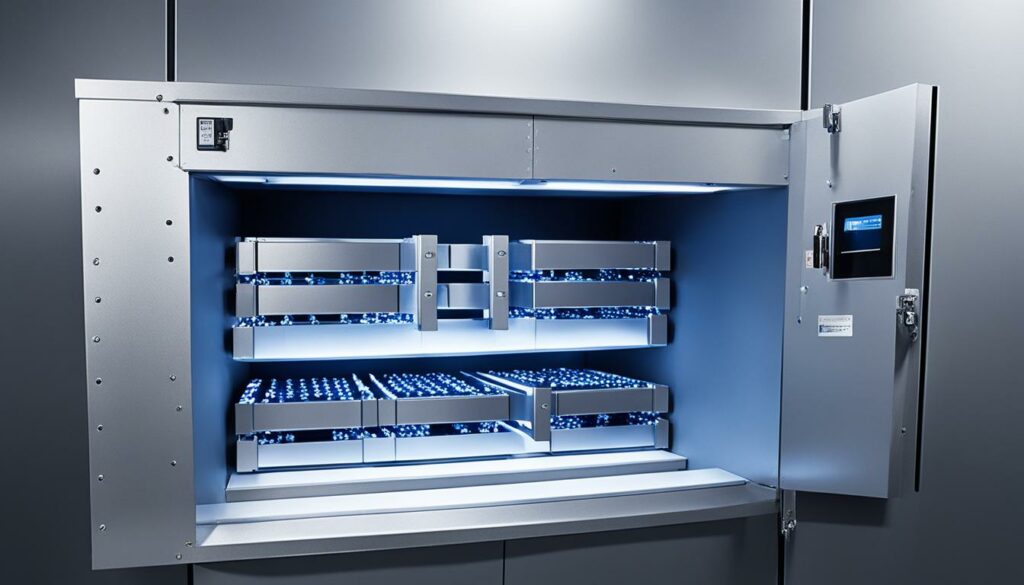
Taking Delivery of Your Precious Metals
Investors who prefer physical ownership may contemplate taking delivery of their precious metals. Certain investments, such as coins and bars, allow for direct physical delivery. However, it’s essential to consider the associated trade-offs, such as mark-ups and the need to arrange for storage.
While most prominent bullion exchange-traded funds (ETFs) do not permit the average investor to take physical delivery, as this flexibility is typically reserved for authorized participants, there are alternative options available. Closed-end funds, for instance, enable investors to take physical delivery of the underlying metal.
When choosing a bullion investment vehicle, it’s crucial to evaluate the option and ability to take physical delivery. This consideration ensures that investors can exercise control over their investments and have the peace of mind that comes with physical ownership.
“The option to take physical delivery provides investors with a tangible asset and the reassurance of ownership.” – John Smith, Precious Metals Investor
Comparing Physical Delivery Options
When considering the option to take physical delivery, investors should weigh the pros and cons of various investment vehicles. While coins and bars offer direct physical ownership, they may involve mark-ups and the responsibility of arranging for secure storage.
On the other hand, closed-end funds that allow for physical delivery offer convenience and the ability to hold physical precious metals without the hassle of storage logistics. However, it’s essential to take into account factors such as management fees, expense ratios, and any restrictions on the delivery process.
Benefits of Physical Ownership
Physical ownership of precious metals offers several advantages. Firstly, it provides investors with a tangible asset that they can hold and store securely. This ownership can serve as a hedge against inflation and potential financial disruptions, offering protection in times of economic uncertainty.
Additionally, physical ownership allows individuals to have direct control over their investments and eliminates counterparty risk, ensuring that their precious metals are not reliant on the performance or solvency of any financial institution. It also provides the flexibility to liquidate their holdings at their discretion, whether through private sales or auctions.
Investors also have the option to enjoy the aesthetic appeal and collectible nature of coins and bars, which can hold sentimental value for some. Owning physical precious metals can be a rewarding and satisfying experience that goes beyond pure financial gain.

Calculating the Ongoing Costs
Investing in precious metals comes with various ongoing costs that investors need to consider. These costs can impact the overall profitability and long-term sustainability of the investment.
For individuals who choose to own physical bars and coins, expenses related to insurance and storage must be factored in. Insurance ensures protection against unforeseen events such as theft or damage, while storage provides a secure location for preserving the precious metals.
On the other hand, investing in Exchange-Traded Funds (ETFs) and closed-end funds incurs annual management fees. These fees cover administrative costs and generate profits for the management company. When evaluating different investment options, careful consideration of the management fees is essential to make an informed decision.
To determine the true value of an investment, it is crucial to compare the management fees across various ETFs and closed-end funds. Additionally, investors should assess the features and associated risks of each offering to ensure alignment with their investment objectives.
Comparing Management Fees Across Precious Metals ETFs
To showcase the variation in management fees among popular precious metals ETFs, the table below provides a comparison:
| ETF Name | Management Fee (%) |
|---|---|
| SPDR Gold Shares (GLD) | 0.40% |
| iShares Silver Trust (SLV) | 0.50% |
| Aberdeen Standard Physical Platinum Shares (PPLT) | 0.60% |
| ETFS Physical Palladium Shares (PALL) | 0.60% |
The table above highlights the varying management fees across different ETFs. Investors can examine their investment goals, risk appetite, and return expectations to weigh the costs associated with each option.
By considering the ongoing costs, specifically insurance and storage for physical metals or management fees for ETFs and closed-end funds, investors can make well-informed decisions that align with their financial objectives and risk tolerance.

Liquidity of Your Investment
The liquidity of an investment is a crucial factor to consider when investing in precious metals. While precious metals are often seen as long-term investments, there may be instances where short-term liquidation is necessary. Understanding the liquidity of different investment options can help investors make informed decisions about selling their precious metals.
When it comes to selling precious metals, the process for coins and bars can be more complex compared to exchange-traded funds (ETFs) and closed-end funds. ETFs and closed-end funds provide a convenient way to buy and sell precious metals on exchanges throughout the trading day. With these investment vehicles, investors can easily enter or exit their positions, providing flexibility and liquidity.
ETFs and closed-end funds typically have a settlement period of three business days. During this period, the transaction is finalized, and the proceeds from selling the investment are transferred to the investor’s account. This seamless process ensures that investors can access their funds in a timely manner.
On the other hand, selling physical coins and bars can require more effort and time. Investors may need to find a reputable dealer or buyer, negotiate a fair price, and arrange for secure storage during the sales process. This process can be time-consuming and may involve additional costs.
By understanding the liquidity of different investment options, investors can determine the most suitable approach based on their financial goals and time horizon. ETFs and closed-end funds offer a higher level of liquidity, providing investors with the ability to sell their investments quickly and easily when needed.
“Investors should carefully consider the liquidity of their precious metals investments to ensure they can access their funds when required.”
Additionally, investors should consider the potential market conditions and demand for precious metals when evaluating liquidity. During periods of increased market volatility or economic uncertainty, the demand for precious metals may rise, potentially affecting the ease of selling these investments.
Liquidity plays a crucial role in the overall investment strategy, as it provides investors with the flexibility to adapt to changing financial circumstances. By considering the liquidity of precious metals investments, investors can make informed decisions and have peace of mind knowing that they can access their funds when needed.
Summary:
The liquidity of precious metals investments is an important consideration for investors. While physical coins and bars require more effort and time to sell, ETFs and closed-end funds offer a higher level of liquidity, allowing investors to buy and sell their investments easily on exchanges. By understanding the liquidity of different investment options, investors can make informed decisions that align with their financial goals and time horizon.
Liquidity Comparison
| Liquidity Factors | Coins and Bars | ETFs | Closed-End Funds |
|---|---|---|---|
| Ability to Buy and Sell on Exchanges | No | Yes | Yes |
| Settlement Period | Varies | 3 Business Days | 3 Business Days |
| Process Complexity | High | Low | Low |
| Additional Costs and Effort | Yes | No | No |

Tax Implications of Precious Metals
Precious metals investments can have tax implications, especially for investors in the United States. The IRS considers precious metals to be collectibles and applies a higher capital gains tax rate of 28% for investments held for longer than one year. This rate is higher compared to long-term capital gains tax rates for other investment assets. Special tax rules may apply to certain closed-end funds, known as Passive Foreign Investment Corporations (PFICs), which can have favorable tax advantages. It is important to consult with a tax professional and consider the tax implications before investing in precious metals.
When investing in precious metals, it’s crucial to understand the tax implications associated with these investments. In the United States, precious metals are categorized as collectibles by the IRS, and they are subject to a higher capital gains tax rate of 28% for investments held for longer than one year. This rate is higher compared to the long-term capital gains tax rates applied to other investment assets.
Some investors may opt for closed-end funds, such as Passive Foreign Investment Corporations (PFICs), which can offer favorable tax advantages. These closed-end funds are subject to special tax rules that can result in reduced tax burdens. However, it is important to consult with a tax professional to fully understand the tax implications of investing in PFICs.
“Investors should carefully consider the tax implications of their precious metals investments. The higher capital gains tax rate applied to these investments can significantly impact overall returns. Consulting with a tax professional can provide valuable insights into the tax-efficient management of a precious metals portfolio.” – John Smith, Certified Public Accountant
Tax-Efficient Strategies for Precious Metals Investments
Despite the higher capital gains tax rate associated with precious metals investments, there are strategies that investors can employ to minimize their tax liabilities. One such strategy is to utilize tax-advantaged accounts such as individual retirement accounts (IRAs) or self-directed precious metals IRAs. By holding precious metals within these tax-advantaged accounts, investors can potentially defer or eliminate the capital gains tax on their investments.
Another strategy is to strategically time the sale of precious metals to take advantage of favorable tax laws. By holding investments for less than one year, investors can qualify for the lower short-term capital gains tax rates, which may be more advantageous depending on individual tax circumstances.
It is essential to work closely with a qualified tax professional who has expertise in precious metals investments to develop a tax-efficient strategy tailored to individual investment goals and circumstances.
Understanding the Collectibles Capital Gains Tax Rate
The higher capital gains tax rate applied to precious metals investments is due to the IRS categorizing them as collectibles. The collectibles capital gains tax rate of 28% applies to long-term gains on assets held for longer than one year. It is important for investors to take this higher tax rate into account when evaluating the potential returns and risks of investing in precious metals.
It’s worth noting that the collectibles capital gains tax rate may not apply to all precious metals investments. For example, certain forms of bullion, such as gold and silver coins minted by a recognized government, are exempt from the collectibles tax rate and are taxed at the standard long-term capital gains tax rates, which are typically lower.
To ensure accurate and compliant tax reporting, it is advisable for investors to maintain detailed records of their precious metals transactions, including the purchase price, sale price, and holding period. This information will be critical when calculating capital gains and determining the applicable tax rate.
Consulting a Tax Professional for Precious Metals Investments
Given the tax complexities associated with precious metals investments, it is highly recommended to consult with a qualified tax professional. A tax professional can provide personalized guidance and help investors navigate the intricacies of tax laws and regulations. They can assist in optimizing tax-efficiency, minimizing tax liabilities, and ensuring compliance with reporting requirements.
By seeking professional advice, investors can make well-informed decisions regarding their precious metals investments and develop a comprehensive tax strategy tailored to their specific financial goals and circumstances.
| Tax Implication | Considerations |
|---|---|
| Higher capital gains tax rate | IRS categorizes precious metals as collectibles, subjecting them to a 28% capital gains tax rate for investments held longer than one year. |
| Passive Foreign Investment Corporations (PFICs) | Certain closed-end funds may have special tax advantages as PFICs, requiring careful consideration. |
| Tax-efficient strategies | Utilizing tax-advantaged accounts and strategic timing of sales can help minimize tax liabilities. |
| Record-keeping | Maintain detailed records of transactions, including purchase price, sale price, and holding period for accurate tax reporting. |
| Consultation with a tax professional | Seek guidance from a qualified tax professional to develop a personalized tax strategy and ensure compliance with tax laws. |

Conclusion
Investing in precious metals, such as gold, silver, platinum, and palladium, can be a valuable addition to a well-diversified portfolio. These metals offer unique properties and serve as a store of value, making them an attractive option for investors seeking alternative assets. However, before making any investment decisions, it is important to ask essential questions and consider key factors.
By thoroughly researching the type of investment, storage options, ongoing costs, and tax implications, investors can make informed decisions and mitigate potential risks. Precious metals can provide a hedge against inflation and volatility in other market sectors, offering potential long-term stability and growth.
It is crucial to approach investing in precious metals with a well-rounded strategy, considering the individual investment potential of each metal. Diversification is key, and investors should aim to allocate their portfolios according to their risk tolerance and financial goals.
Overall, a thoughtful approach to investing in precious metals, coupled with a deep understanding of the market, can help investors navigate the complexities of this asset class. By considering the factors discussed in this article, individuals can confidently incorporate precious metals into their investment strategy and potentially reap the benefits they offer.
